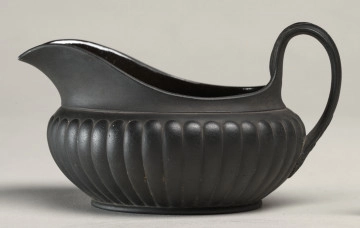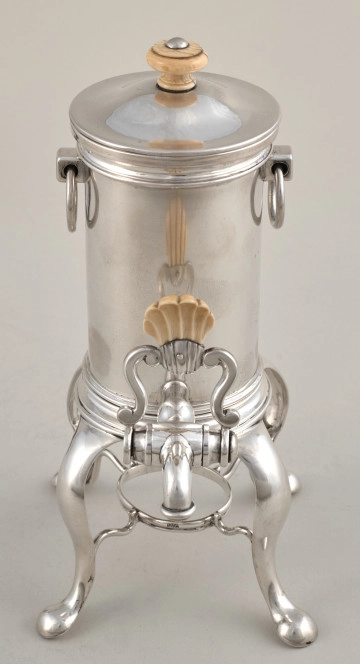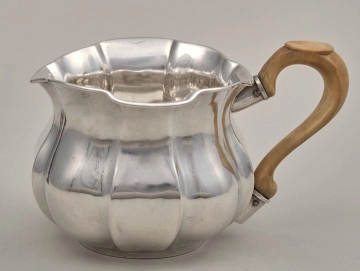
Milk vessel
19th (?) century
Castle Museum in Łańcut
Part of the collection: European enamelworks
A round shallow bowl with a collar modelled from six cavities, both sides covered with a decoration of floral motifs contained in oval reserves. Its maker used orange, yellow, green and blue dyes to the biggest extent. Colour flowers painted against a white background are dominant in grooves of the collar; on the outside, against a black background, all are delicately gilded. Fragments of two missing handgrips are visible on both sides. The oval bottom has the Caritas Romana scene painted en grisaille against a black background. The outer decoration of the bottom is formed by a landscape with two small houses with steep roofs, against a group of trees. Such a set of decorative motifs is very specific to vessels of this kind, which is confirmed by examples preserved in the collections of the Louvre or Victoria and Albert Museum.
The representation of the Caritas Romana motif is one of the three examples known in Wilanów collections, alongside Italian paintings (Wil.1633, Wil.1708). It is an illustration of the story of a woman called Pero breastfeeding a shackled old man. The grey-haired man is her father Cymon, imprisoned and sentenced to death. Pero visits and breastfeeds him every day, saving him from death by starvation. After the discovery of this deed, caused by the daughter’s commitment and boundless love for her father, both were allowed to leave the prison and the penalty was spared.
This story was described for the first time in Factorum et dictorum memorabilum libri IX – a work by Valerius Maximus, a Roman writer living in the 1st century A.D. Dating back to earlier Hellenistic sources, this legend was often presented on frescoes from the Roman period. This motif later became very popular, serving as an inspiration for many works of art.
The bowl (with a flat bottom and a low six-part collar with double handgrips) is one of the three vessels with a very similar shape that are kept in Wilanów collections (alongside Wil.209 and Wil.210).
All three of them were shown to the Warsaw audience during An Exhibition of Antique and Art Objects in the palace of Count August Potocki and his wife at Krakowskie Przedmieście 32 (today the Museum of the University of Warsaw) in 1856. It is described in the catalogue of this exhibition under item 810.
Joanna Paprocka-Gajek
Dimensions
entire object: height: 4,0 cm, width: 13,7 cm
Technique
enamel
Material
copper
Owner
Museum of King Jan III's Palace at Wilanów
Identification number
Location / status

unknown
19th (?) century
Castle Museum in Łańcut

unknown
19th (?) century
Castle Museum in Łańcut

unknown
19th (?) century
Castle Museum in Łańcut
DISCOVER this TOPIC
National Museum in Lublin
DISCOVER this PATH
Educational path
0/500

We use cookies to make it easier for you to use our website and for statistical purposes. You can manage cookies by changing the settings of your web browser. More information in the Privacy Policy.
We use cookies to make it easier for you to use our website and for statistical purposes. You can manage cookies by changing the settings of your web browser. More information in the Privacy Policy.
Manage cookies:
This type of cookies is necessary for the website to function. You can change your browser settings to block them, but then the website will not work properly.
WYMAGANE
They are used to measure user engagement and generate statistics about the website to better understand how it is used. If you block this type of cookies, we will not be able to collect information about the use of the website and we will not be able to monitor its performance.